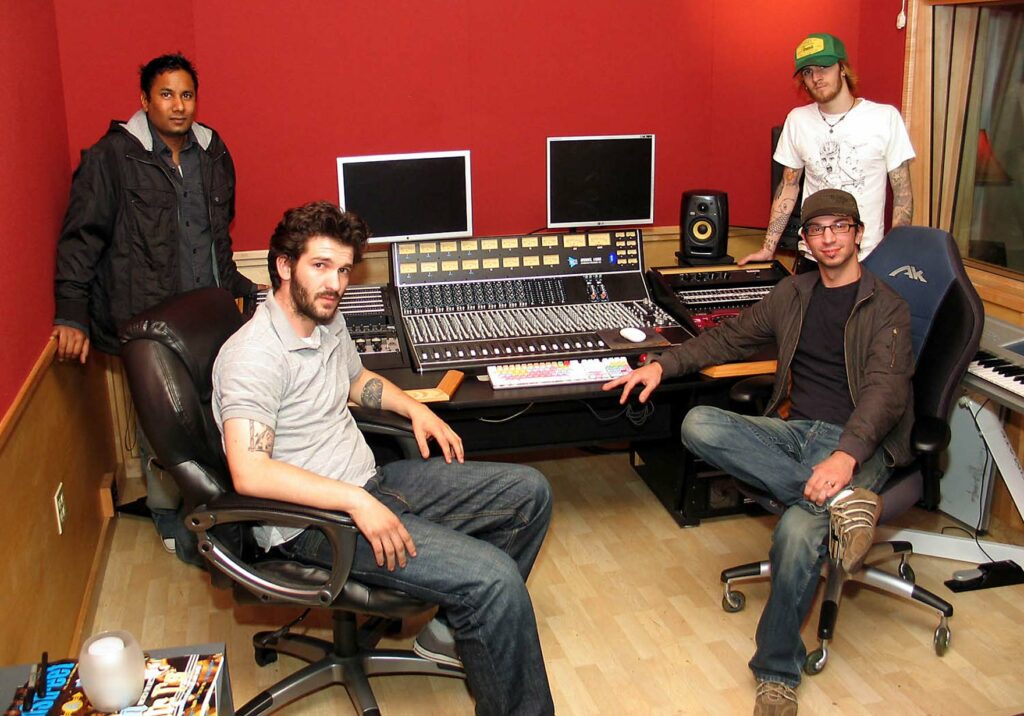North Hollywood, CA – Feb. 2009:
SuperControl Recording Studios, set up by a trio of musicians to provide engineering and production services to fellow independent artists, has become the first commercial facility in Southern California to install an API 1608 discrete analog recording console. SuperControl has been open for business since January of 2008, when the partners moved into a previously outfitted and acoustically-designed space located at the renowned Bill's Place rehearsal studios in North Hollywood.
SuperControl was intended from the beginning to satisfy the demand from independent artists to be able to work with an engineer and producer who could ensure high-quality recordings at an affordable cost and, most importantly, be creatively invested in their projects. With the intention of installing a mixing console that would help realize that plan, while also complementing their personal collections of recording equipment, business partners Paul Ludemann, Brian Siegel and Kris Haavig purchased a new 16-input 1608 from API rep Vintage King, with Ryan McGuire handling all the details.
"We thought the API would be a good addition to those purist concepts," explains Ludemann, who initially partnered with fellow Los Angeles Recording School alum and musician Siegel in a project studio before deciding to rent a larger facility. They then brought in Haavig, who attended McNally Smith College of Music in Minneapolis with Ludemann and is also his band mate in Aberrance, the band they relocated to Los Angeles three years ago. "It's another way that we can help indie artists get a really clean sound and compete with all the other top-notch facilities. Plus, a board of this size made it perfect for us to be able to jump right into an API," adds Ludemann.
The API 1608 console is installed with a Digidesign Pro Tools|HD2 system and a collection of analog and digital outboard equipment, including Apogee converters, plus JBL and KRK nearfield monitors. "We did some of our initial mixes all in-the-box and I was never very satisfied with those," says Ludemann, who notes that he had to work hard to produce a satisfactory final product in the DAW. By comparison, he continues, the cohesion that the API brought to the mixes was immediately apparent: "You take the drums that you may have been running through a submaster in Pro Tools and monitor them individually on the board and it's night and day. It's really obvious."
The standard API 1608 incorporates twelve 550A three-band equalizers and four 560 ten-band graphic EQ modules. SuperControl also had a pair of API 525 discrete compressor modules installed.
As Ludemann explains, the seed for SuperControl was planted following a less than satisfactory experience with an under-qualified engineer at a recording session. "The engineer didn't know what he was doing. At one point he said, 'I wish I went to school for this.' I thought, I'm paying you and you mention that? I've found that a lot of engineers, more often than I thought, weren't really artists or musicians or creative minds. I figured there's a need for artists – especially indie artists – to be able to communicate with the engineer. That was our goal with starting the studio, and why I got involved as an engineer."
Offering an example, he relates, "There's two new groups, Sleep For Now and Bullet Made Statues that I'm mixing. They like to come in and we talk conceptually. I work to connect with their idea, the art behind the music and establish trust. If I understand their concepts and we're really communicating, I can do more for them than they can imagine or that they would even know to ask for."
Sharing that the partners also have plans to start an independent record label, Haavig says, "Our goal, being that we are artist-musicians and have been for a long time, and understanding how it works, is to try and be a part of the community, to show other artists what it's like to be in a studio and give them an opportunity to get a great sound. I think it helps them understand how they can be better, and also helps them really believe in themselves."
Haavig adds, "We also want to do the non-profit thing. We've talked to some kids at school once or twice and we're hoping to eventually put together something where kids can come in and work with us, and we can give them a chance to be in the studio. We feel there's karma involved. If we do that, good things will happen!"
